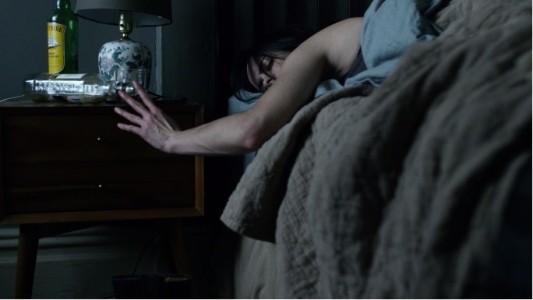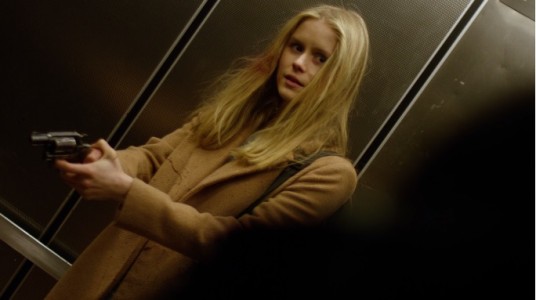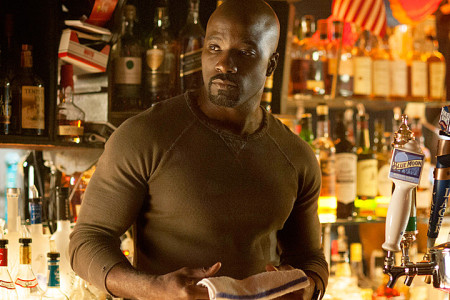*Spoiler Warning!*
Marvel’s latest Netflix series, Jessica Jones, has finally hit the Internet, following the incredibly well executed and bar setting, Daredevil. The titular character is one of very little familiarity to the mainstream audience of Marvel’s universe. However, much like the highly successful Guardians of the Galaxy and Ant-Man films, Marvel once again manages to make a seemingly obscure character into one that is both unique and relatable to the audience.
Jessica’s tale is one of extreme anguish, exploring the darkest depths of human nature. It is anything but a glorification of the superhero genre. The tone as such is firmly established within the first few minutes of this episode. The series opens with Jessica hiding in the dark as she snaps pictures of an unfaithful woman having an affair, while her narration reveals her occupation as a private eye detective.

Jessica then returns to her client with photographic evidence of his wife’s affair. The client, in his blind rage, attempts to take out his frustration on Jessica, only to be thrown half way into her office door’s glass window. In a humorous display, Jones is revealed to be an enhanced human being with super strength and the ability to leap at extraordinary heights (which differs from her comic book counterpart, in which she can simply fly). Despite such powerful abilities, Jessica is constantly marred by a dark past, as she is constantly greeted with PTSD created hallucinations and nightmares of a “purple” man (Kilgrave played by David Tennant) torturing her. Soon, this very past comes back to haunt her as Jessica’s more recent clients’ daughter is abducted by the same mysterious figure.
Storytelling
Just to be perfectly clear, this is a great first episode. Especially in regards to following up a series as nearly flawless as Daredevil; Jessica Jones more than holds its own. In any given story, whether it be a film, TV show, novel, or a video game, it is absolutely essential to “show, not tell.” Meaning, the writing should allow its character’s actions or the implied message of events drive a story instead of outright grabbing the viewer by the shoulders and screaming exposition to his or her face for the majority of the time. This is exemplified by the introduction of the protagonist, Jessica. Jones’ horribly traumatic past is more than understood by the viewer by the previously stated hallucinations and nightmares. All that is seen are brief glimpses of a purple man whispering in her ear or touching her slightly. And yet this is more than enough to establish an unsettling amount of fear and paranoia. In addition, Jessica’s sloppy everyday lifestyle and sarcastic demeanor conveys her pessimistic outlook on life. Jones is simply living just to exist.

This episode also excels in building tension while employing a satisfying payoff in the end, which is more than I can say for most films I’ve seen in the past year or so (*cough* Spectre *cough*). As mentioned before, the villainous Kilgrave is established by Jones’ PTSD riddled memories. This all reaches a boiling point near the end of the episode, when a young girl named Hope (played by Erin Moriarty), whom Jones is searching for, is revealed to be victimized by Kilgrave as well. During her abduction, Hope had been forced to do unspeakable things under Kilgrave’s control, more than likely sexual activities and general enslavement. Upon learning of Kilgrave’s return, Jessica opts to immediately flee New York via flight to Hong Kong. However, against her own better judgement and instincts, Jessica decides instead to rescue Hope and return the poor girl to her parents. When all seems to end well, Hope pulls out a snub nosed revolver and brutally murders her parents in an elevator before Jessica could reach them. She then stares blankly and forces a grin, saying “smile!” the very words Kilgrave once told Jessica years ago.

This conclusion to the episode perfectly entails the series’ tone as well as introducing the severity of the main villain’s abilities. Without even meeting Kilgrave, the audience understands the threat he poses from the actions of those he has victimized.
Characterization
If there’s one thing Marvel consistently gets right, it is their ability to cast the right actors for any given character. This is true for both their films and especially true for their TV shows. Krysten Ritter as Jessica Jones could not have been better cast. She seems to specialize in playing characters that are damaged but strong willed and that is no different with Jessica Jones. Minor details like the expression of pain and restlessness on her face or the sarcastic delivery of lines (“I’m going to melt you with my laser eyes”) all make up a faithful interpretation of the character.
Additionally, her chemistry with co-star Mike Colter, who plays Luke Cage, is also strong. And thankfully so, as any comic book fans will know how important their relationship becomes down the road. Mike, while given few scenes, manages to display a smooth talking character with underlying, deeper nuisances that have yet to be revealed (he seems to be a womanizer, but secretly looks as though he longs for more). I look forward to seeing him more established in future episodes as well as in the upcoming Luke Cage series.
The other side characters are no slouches either. Erin Moriarty as Hope suitably expresses a young woman’s loss of innocence. Carrie-Anne Moss as Jeri Hogarth, a character that was originally a man, portrays a great “no nonsense” attitude attorney with secrets of her own.
What is perhaps most interesting about the character of Kilgrave in this episode is the fact that he hardly has a real physical presence and yet can still be “felt” by the both the viewers and the characters involved. This is due in large part to both David Tennant’s disturbingly well done performance and the choice in narrative structure. Tennant’s brief appearances are still more than enough to express the sheer gravitas of the villainous Kilgrave. He is well spoken, nicely dressed, and seemingly polite, but also incredibly sadistic in nature. The creepy visual pop ins by Kilgrave are executed in a suitably disturbing manner. In one instance, Kilgrave whispers into Jessica’s ear, only to vanish as she realizes it was only a hallucination. In another, Kilgrave licks Jessica as she’s asleep, then suddenly disappears as she wakes. Smalls moments like these speak volumes of Kilgrave’s character with little screen time and dialogue.

The verdict: overall, this was an excellent establishing episode that did everything it was supposed to do and then some. It’s a bit slow at times, but it was necessary to build up the tension and to establish its universe. This is definitely a must see, but not for the faint of heart (or children!) You’re not going to see Disney advertising Jessica Jones action figures for kids this Christmas….
4.5/5


